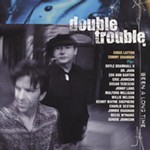Musical Chairs
Austin Music Liaison Quits
By Andy Langer, Fri., Nov. 22, 1996
 illustration by Tom King |
The first of those questions involves the future of the Austin Music Commission, a nine-member advisory board created by the city council in 1989 and charged with making music policy recommendations to the city. In fact, the story of the Austin Music Liaison position and the ACVB's involvement essentially begins and ends with the Austin Music Commission itself. In 1990, the Music Commission recommended that the city council create the position of Music Liaison as a conduit between city government and the commission. Later that year, the Department of Planning and Development hired local jazz musician Bob Meyer to the newly created Austin Music Liaison post.
"I was the paid professional staff for the commission," says Meyer, whose job put him in charge of marketing Austin's music scene, the subsequent publicity, and all music-related disputes. "The commission made recommendations to council and created programs, which then became up to the staff (me) to implement and administrate."
Last September, the city manager's office decided that the Department of Planning and Development wasn't the proper supervisory body for the music liaison office, so Meyer's operation was moved over to the ACVB offices, which had already begun experimenting with marketing the local music scene by hiring then-former KGSR deejay Kevin Connor and local industry veteran Kristen Nagel to the newly created posts of Austin Music Entertainment Specialists. By the time Meyer arrived shortly thereafter, however, those two marketing-specific positions no longer existed, so the music liaison office was asked to spend more time drafting a marketing plan that the ACVB could use.
Over time, however, Meyer's relationship with ACVB Director Karen Jordan became, at best, strained. Then, earlier this year, Jordan made the simultaneous announcements that she would be leaving the ACVB and seeking the ACVB's privatization. With a privatized ACVB, contended Jordan, the city's bed tax fund (revenues from the state's hotel/motel tax) would face less bureaucratic restrictions and increase the effectiveness of the ACVB's marketing and tourism agenda.
But as the Chronicle reported in "Experience the C.H.A.R.M." (Vol. 16, No. 1), this privatization scenario also stood to make Meyer the only city-paid employee at a privatized ACVB. And because the music liaison office would be "supervised" by the ACVB, but financed out of the city's general fund, to whom would Meyer really answer? Meyer downplays the significance of the potential transitional problems even now, but admits that in the end, by resigning, he chose not to wait around for the answers. "I was losing my passion for it anyway," says Meyer, who will now concentrate on a jazz publishing business.
Under the ACVB's new privatization contract with the city, the Music Liaison Office now receives money from both the city and the ACVB -- thanks mostly to the lobbying of Music Commission Chair Carlyne Majer. Lisa Rolke -- once Meyer's assistant and now the acting music liaison until the ACVB replaces Jordan and that replacement decides whether to start searching for someone to replace Meyer (the job was posted until last Friday) or give the job outright to Rolke -- says the music commission's agenda is safe despite the fact that a city employee will be working for a private organization.
"It should be the same as before," says Rolke. "I'll be working with the city council on any issues the commission has, because the Music commission continues to be staffed by the Austin Music Liaison. Just because the bureau's private and I work with the bureau, nothing should be different. The only difference is that it will be myself instead of Bob acting as the staff."
Although Meyer is publicly backing Rolke in her campaign for the full-time job, he also seems less convinced that the ACVB's privatization will leave the commission's work unaffected. "The commission makes recommendations, the council makes decisions, and the city manager's office implements them," explains Meyer. "It's critical that the liaison understand that what's going on within the city bureaucracy and privatization can change that to an extent. It's important that whoever gets this job knows how to move around the city structure because it involves constant communication with city departments. And if the new [ACVB] director is smart, they'll leave what's in place and let [Rolke] develop."
This of course begs the question about what exactly it is that the music commission already does for local music. After a period of infrequent meetings and general disorganization under the leadership of local promoter French Smith, the last two years with Carlyne Majer at the helm have seen the music commission refocusing their efforts on both the Music Industry Loan Guarantee Program and the Instrument Loan Program. The latter loans instruments to local students and schools, while the former helps secure funds for upstart music-related business, as detailed in "Brother, Can You Spare a Dime?" (Vol 14, No. 20). According to Meyer, though, this is just what's visible on the outside.
Like most government-sanctioned bodies, the music commission is really a back-room player negotiating with city departments for better music-related attention. "When you look at the ordinances for smoking, noise, and street closures, you see the commission as advocate for the scene -- ensuring that the language of these ordinances protects the music community," says Meyer. "It doesn't make for sexy newspaper reporting, but it all has political ramifications."
In fact, since Majer has taken over, Meyer insists that the music commission has been effective. "It functions pretty well," he says. "The commission's been very effective in getting council to see the scene's importance and mandate programs to protect its integrity."
As for Majer, she's under the impression that little of the commission's agenda will change with the music liaison under the privatized ACVB's supervision. "Anything that goes in front of council that could affect the Austin music scene we'll be examining," she says. Currently, Majer and the other eight music commissioners are dealing with loading policies for Sixth Street musicians, street closure policies for events, music's role at the new airport, the creation of an Austin music museum, and a revisiting of the smoking ordinance's effectiveness.
If music at the new airport and an Austin music-related museum sound like marketing tools, the crossover interest between the ACVB's marketing agenda and the commission's goals for a higher-profile scene are entirely intentional. "Although it's not limited to this, ACVB's primary goal as an institution is to put people in hotel rooms through conventions and tourism," says Meyer. "The liaison and commission's goals for a healthy and conflict-free scene are not inconsistent with putting people in hotel rooms. A strong scene underscores the ability to market it inside and outside of town."
In fact, Rolke or her replacement will have a unprecedented budget of $23,000 earmarked for Austin music marketing. It's here, says Meyer and Majer, where a privatized bureau may prove itself as an effective catalyst for music marketing -- in that the ACVB and the Music Liaison will now be one entity that theoretically understands the necessity of effective marketing. Additionally, privatization has also freed the ACVB to use that bed tax budget for barter and trade with private organizations that impact on local scene-building and outside tourism interests.
Most of those involved with the Music Commission say they're taking a wait-and-see attitude about the ACVB's privatization. After all, says Majer, "We can always revisit it and see if we want the General Fund's moneys pulled out of the contract a year from now."
More importantly, however, is finding replacements for Jordan and Meyer, which, at this point, may be the initial roadblock to any of the music commission's immediate legislative goals. And although Majer says she's content staying on the outside of the ACVB's hiring and firing decisions, Meyer recommends that ACVB consult the music commission when hiring a new music liaison. "The key is that the music commission should be the guiding factor in what the music liaison position is all about," says Meyer.
At this point, there appears to be no short list for the music liaison job -- other than Rolke's apparent interest in the interim. But former ACVB employee Kevin Connor says the shake-up could be a chance for the music commission, ACVB, and the music scene itself to reinvent itself and better focus its local agenda and outside marketing efforts.
"Whoever winds up with this job is going to need creativity to realize what needs to be done and the discipline to follow through," says Connor. "People talk all the time about the lack of infrastructure in the Austin music business and this may wind up the perfect infrastructure job."








